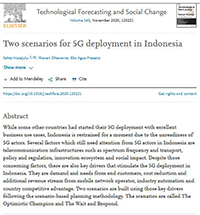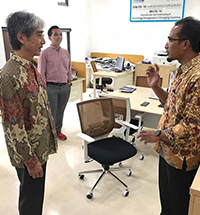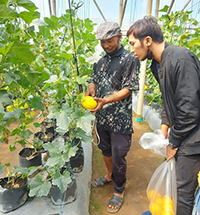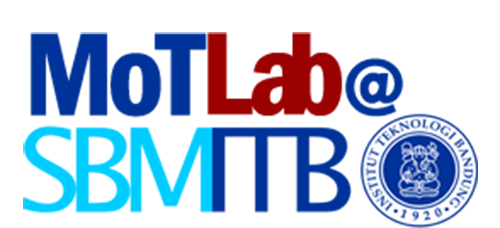Technology ManagementTechnology Management
On the topic of research related to technology management, we carry out research on special themes such as smart factories in Indonesia "Making Indonesia 4.0" from the point of view of industry sector focus and strategic policy. The industrial sector consists of food & property, textile & clothing, automotive, chemical, and electrical that represents 65% of national exports and primary technologies to support industry 4.0 system establishment, namely Internet of Things, Artificial Intelligence, Human-Machine Interface, Robotic and sensor technology, and 3D printing (Kemenperin.go.id).
| Business Model Innovation in Digital Startups | |
|---|---|
THEORETICAL SIGNIFICANCE
|
EMPIRICAL SIGNIFICANCE
|


Digital TransformationDigital Transformation
We focus on research on themes related to digitalization, business model innovation in digital startups, digital transformation: business implications & organizational challenges, and industry 4.0 implementation in Indonesia. Indonesia as the object of research is predicted that its digital economy is predicted to reach $130 billion by 2025, it's already at $40 billion this year – 49% growth in average per year. E-commerce and ride-hailing have become the main industry; as the digital payment dominating all the app-based services. The related growth is supported by endless investment. It includes funding for Indonesian unicorns, the value is at $4 billion in 2018 (dailysocial.id, 2019). Another important theme is smart city, big data, artificial intelligence and social media in Indonesia.
| Digital Transformation: Business Implication & Organizational Challenge | |
|---|---|
THEORETICAL SIGNIFICANCE
|
EMPIRICAL SIGNIFICANCE
|
| Industry 4.0 Implementation in Indonesia | |
|---|---|
THEORETICAL SIGNIFICANCE
|
EMPIRICAL SIGNIFICANCE
|



Technology Adoption and CommercialisationTechnology Adoption and Commercialisation
Technology adoption and commercialization which is the research topic of MoT Lab can be lowered into several themes such as Acceptance of Electric Vehicle in Indonesia: Case Study in Bandung, Green Radical Innovation Ecosystem in Developing Country: Case of Electric Vehicle Adoption in Indonesia, Effect of Knowledge Transfer in Technology Adoption on Innovation: The Case of E-Fishery, and Commercialization Models of University Research Products.
| Acceptance of Electric Vehicle in Indonesia: Case Study in Bandung | |
|---|---|
THEORETICAL SIGNIFICANCE
|
EMPIRICAL SIGNIFICANCE
|
| Green Radical Innovation Ecosystem in Developing Country: Case of Electric Vehicle Adoption in Indonesia | |
|---|---|
THEORETICAL SIGNIFICANCE
|
EMPIRICAL SIGNIFICANCE
|
| Effect of Knowledge Transfer in Technology Adoption on Innovation: The Case of E-Fishery | |
|---|---|
THEORETICAL SIGNIFICANCE
|
EMPIRICAL SIGNIFICANCE
|
| Commercialization Models of University Research Products | |
|---|---|
THEORETICAL SIGNIFICANCE
|
EMPIRICAL SIGNIFICANCE
|

